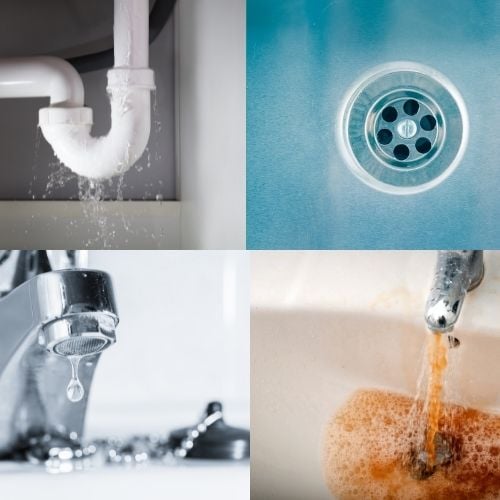No matter how prepared we are in life, unwanted surprises do happen. Sometimes, they’re plumbing related. In those cases, thankfully, there are emergency plumbers ready for the challenge. Emergency plumbers are on call but will cost more than regular plumbing services open during business hours. As such, it is important to know what really constitutes a plumbing emergency.
In this blog, we're going to explore some of the stressful plumbing scenarios that will need the immediate service of a professional. After a quick read, you'll Be able to confidently decide when it is time to call in an emergency plumber.
Questions to consider
When you're trying to determine whether you have a plumbing emergency on our hands, consider the following questions. Any type of plumbing problem can be stressful. Try to remain calm and think through your options. These guidelines can help you handle the situation in the most efficient way.
Can you turn the fixture off? If the answer to this question is yes, then you're out of the woods. Fixtures like sinks and toilets are easy to shut off. If a fixture like this has a small leak, you are safe to shut off the water and wait until normal business hours to call your plumber. Just look behind the unit for a shut off valve. If the leak is a little bigger, you may be able to control the problem by turning off the main water line to your house. You can usually find the main shut off valve next to the water meter.
Do you need to use the plumbing right away? Dealing with a clogged toilet that you can't seem to fix on your own? If you live in a two-bathroom house, you are safe to wait until morning to call the plumber. When the affected plumbing is not necessary for safe living conditions, you can put it on pause. Just remember to tape a note to the fixture reminding the household that it’s off limits.
Will the problem cause more damage if it's not addressed? Leaks come in all different sizes. Some of them are small enough to manage with a bucket. Others, not so much. If you're dealing with a leak that's too big to be contained by a vessel, you should call a plumber now. Any time a leak is too severe to control with simple stopgap measures, you're at risk of water damage. The leak could overflow and soak into the floors, ceilings, and walls, creating serious and costly damage. Avoid that homeowner disaster by calling an emergency plumber when a leak is not containable.
Could extreme temperatures play a factor? Sometimes the weather is what turns a plumbing problem into a plumbing emergency. Extreme temperatures on both ends can make things more urgent. For instance, if your water heater is having issues when the outside temperatures are lower than 32 degrees, you are at risk of freezing pipes. You'll need to call in an emergency plumber. On the other hand, if it's a hot summer day and you don't have running water, you might want to call the emergency plumber to avoid dehydration.
Is it your job to fix it? Homeowners might think that every plumbing problem in their house falls on them. But sometimes the problem is not technically on your property. There might be an issue within the main water line or the sewer main. In those cases, the water company itself may pay for the plumber. Call your water company before you hire an emergency plumber. They can tell you whether the issue falls under the city's responsibility.

These are plumbing emergencies
Now that you have those questions in mind, let's look at some of the most common plumbing emergencies. If you’re dealing with any of these, you need a plumber’s help ASAP.
Standing water Unless you're bathing, you don't want to find yourself among standing water anywhere in your home. Standing water is a sure sign of a burst pipe. The moment you find standing water, you need to look for the source. You may be able to figure out how to safely turn off the water supply that's leading to the leak. If not, call an emergency plumber right away. Otherwise, you're at risk of floor damage, as well as the growth of bacteria and mold.
Discolored water Discolored water is almost always an emergency. It could be a sign that a pipe has rusted or corroded, or that one of your pipes is blocked. Never risk drinking brown water, or bathing in it. Buy bottled water instead and call the plumber right away. Maintaining safe drinking water in your home is always a priority worth an emergency plumber.
Unusually warm floors Have you noticed that suddenly your floors seem to be extra warm? This could very well be a sign that your hot water system is leaking. A leak in the hot water system can heat up the foundation of your home. This makes the floors warm. Although it might be cozy, an unusually warm floor can mean a plumbing emergency.
The sound of running water You probably notice the sound of running water on a regular basis. You'll hear it when you flush the toilet, drain the bathtub, or run the dishwasher. It's a normal part of a home's ambient soundscape. However, if you've been hearing running water outside of any recognizable context, it may be a burst pipe. This is something that you want to address immediately to avoid costly damage and an expensive water bill.
Sewage smells A home's plumbing is set up with mechanisms that prevent the leak of sewer gas. Sometimes, one of these mechanisms fails, causing sewage to linger in the drains. You can spot a sewer system backup by signs like nasty smells, a bubbling toilet, or water coming out of a drain when you flush the toilet. This is a health risk and should not be ignored.
Call in a professional like Geiler immediately.
You might also want to read:
Is Your Water Pressure Too Low?
A Few Reasons Why Your Faucet Is Leaking and How To Fix It
What Is That Smell?


